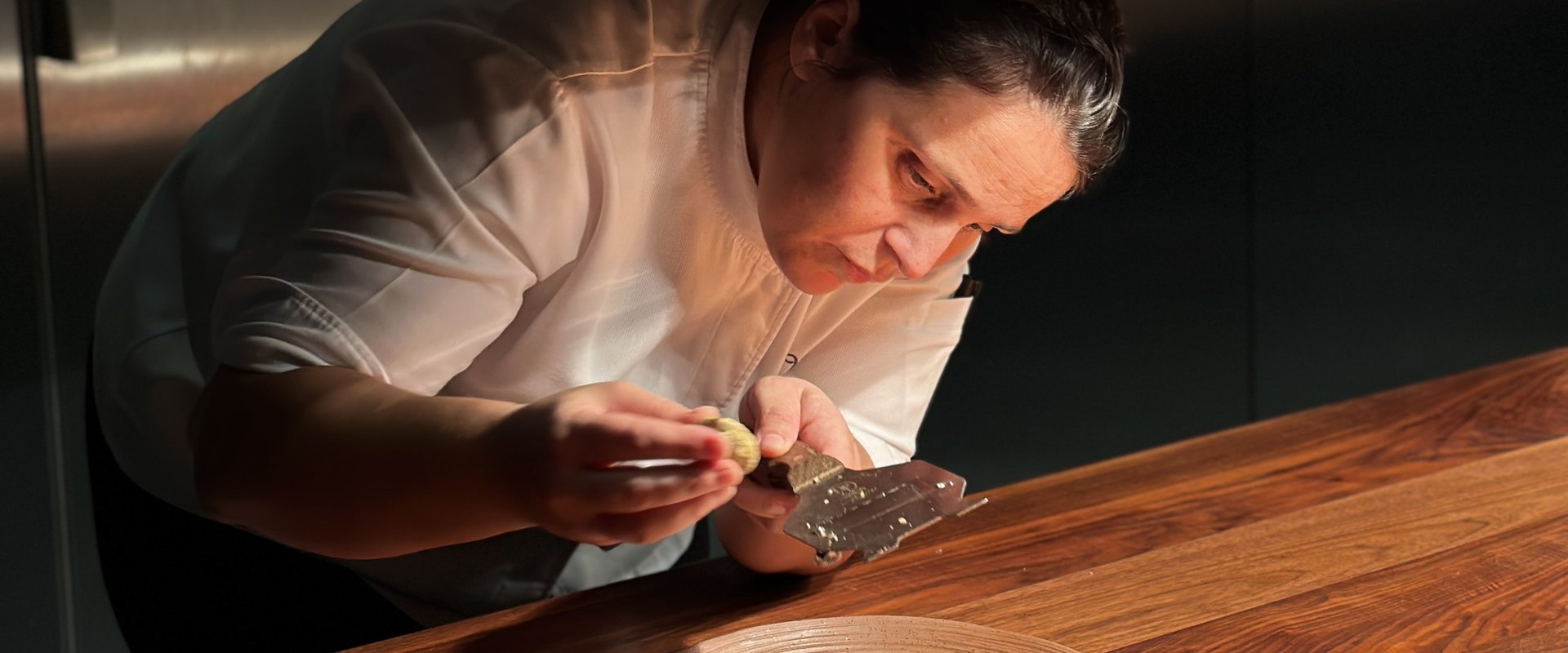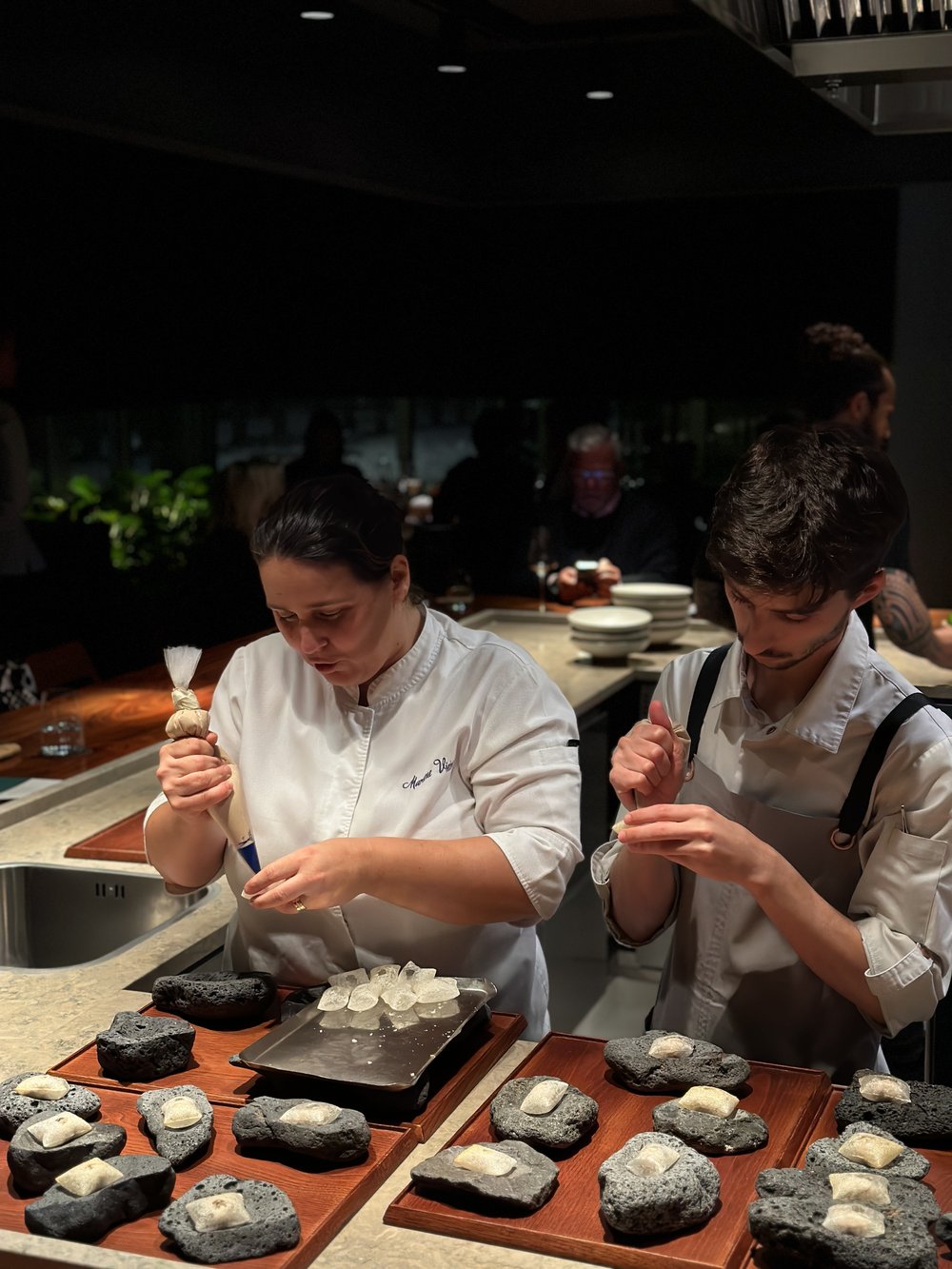Chef Marlene Vieira's Quest to Reimagine Portuguese Gastronomy

Chef Marlene Vieira, from the Lisbon-based restaurant Marlene, aims to reshape perceptions of Portuguese cuisine. She addresses common misconceptions by highlighting the cuisine's rich diversity and culinary innovation. Amidst the pandemic, she successfully launched her laid-back project, Zunzum.
Vieira began her culinary journey at the age of twelve, working in a restaurant while still attending school. At sixteen, she pursued formal culinary training, later expanding her experience at a hotel in Vila do Conde and then in New York at the Portuguese restaurant Alfama. Upon returning to Portugal, she worked in 5-star hotels and various restaurants. Breaking gender norms, Marlene competed in the traditionally male-dominated Chef Cook of the Year contest in 2009, demonstrating her belief that the professional kitchen is a space where women can lead and innovate. Marlene’s journey underscores her commitment to culinary excellence and her determination to challenge societal norms, making her an inspiration for women in the culinary industry.
Last year, Marlene Vieira launched a series of dinners with international chefs who share similar mindsets and values. Enrico Marmo, from the restaurant Balzi Rossi, became the second international guest chef, participating in the second edition of Marlene's seasonal dinner series. This initiative, which also included Slovenian chef Ana Roš of Hiša Franko, aims to celebrate the best of Portuguese cuisine and seasonal products. The series fosters creativity, shares culinary techniques, and showcases the richness of seasonal and local ingredients. Emphasizing sustainability and the excellence of raw materials, the event serves as a platform for these chefs to blend the essence of Portuguese gastronomy with their dishes. Scheduled for October 25, the dinner is set to be an evening of shared culinary passion, with dishes highlighting autumnal ingredients and the distinct gastronomic identities of the participating chefs. This collaboration not only unites two remarkable culinary talents but also aims to position Portuguese gastronomy on the global stage, enriching the dining experience with innovative interpretations and the finest Portugal has to offer.
We have discussed this latest collaboration and her culinary projects in Lisbon with chef Vieira.
What are the main misconceptions you have heard about Portuguese cuisine that you would like to dispel?
I can't consider them wrong ideas, but I would say that the little knowledge about the diversity of dishes and techniques. There are few Portuguese dishes that are generally known to people.
How did you manage to open Zunzum and Marlene during the pandemic?
Zunzum opened in the middle of the epicenter of the pandemic and Marlene was born at the end of it, which was, without a doubt, a great challenge. However, the desire to do it was huge, there was a lot of energy accumulated due to the fact that we were "locked in" and in fact we felt each day, each moment as never before. Zunzum I think ended up having more space in media, its own design is to be an open and airy space in addition to being a new concept of creative and fun cuisine and at that time it was everything we needed. Marlene, being a more intimate and closed space, we decided that its time was later and it also ended up being at the right time.
What is your concept behind Marlene, and what does it bring to the Portuguese culinary landscape?
Marlene is a gastronomic restaurant built to provide its customers with a relaxed and personalized moment, in a half-lit environment, with full visibility of what is being prepared and where they can try new combinations of flavors, new textures, exceptional and seasonal ingredients, combined in one of 2 menus that we have available, in which the customer can only choose between the smallest or the largest. Our goal is that the customer does not create barriers for us and that they let themselves be carried away by our ability to surprise and, therefore, we only accept allergy restrictions. This is perhaps the first gastronomic restaurant in the city with a kitchen in the center of the room, as well as the surprise menu, perhaps the only one.
Which products and techniques are you proud to showcase at Marlene?
Marlene always guarantees exceptional quality of any product and 90% are seasonal, and preferably Portuguese, however, we always give priority to quality.
In the techniques we try to create a link between tradition and innovation, as for example in Portugal the curing of meat and fish was widely used both on the coast as well as in the interior, using the sun, salt, vinegar or the heat of the fireplaces, and in Marlene, we seek to innovate through other means, we use the old techniques in unlikely ingredients, but I think that are the unexpected combinations what make us different.
How do you address sustainability in Marlene and your other projects?
In various ways, such as the seasonality of ingredients, little or no waste, recycling of different materials and the controlled use of plastic.
Why do you think there are few female chefs emerging in Portugal? Is the Portuguese case special or different from the rest of the world?
Female chefs are not as few as we think, yet they do not have the stage that men have. Women cooks in Portugal are more connected to traditional cuisine or neighborhood restaurants, where the media or well-known figure is the owner of the restaurant. However, in the last five years, there have been several women who have opened their own restaurant, the vast majority of them are outside urban centers and without media coverage, all or the vast majority of these cooks have in their curriculum restaurants awarded by the Michelin guide, but when they decided to open their spaces either due to lack of investment support or lack of desire, they chose to open concepts such as bistros or neighborhood restaurants. I think it's a general thing.
Could you tell us about your food memories of Northern Portugal and how they differ from the rest of the country?
The North of Portugal is very close to Spain in its customs and flavors, it is a rich cuisine of intense and hot flavors, the cabidelas, garlic vine, spices and peppers mark my childhood unlike the south where aromatic herbs predominate.
How would you evaluate the collaboration dinners ?
They are moments of sharing the passion for food, ingredients, knowledge and evolution.


What are connection points between you and chef Enrico Marmo from Balzi Rossi ? Tell us more about the dishes you have chosen for the night.
We are from the same generation, we have a huge passion for fish and seafood and the menu was just that, very focused on these seafood products, and in each one of us with its own seasonings. Chef Enrico shared a lot of his identity and we share ours, we always win and our customers even more.
